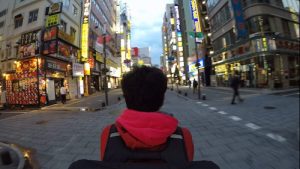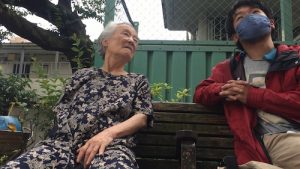Communiqué
A debt-laden grad turns delivery biker, and confronts harsh truths in “Tokyo Uber Blues” on POV – Oct. 21 at 10pm
< < Back to‘POV’ Examines the Social and Economic Implications of the Gig Economy in the National Broadcast Premiere of
“Tokyo Uber Blues”
Monday, October 21 at 10:00 pm
POV, the multi-Emmy® and Peabody award-winning documentary series presents first time filmmaker Taku Aoyagi’s deeply personal experiences as an UberEats rider in Tokyo Uber Blues. Shot in Japan during the 2020 Covid pandemic, shelter-in-place mandates have kept residents housebound, completely transforming the city’s social vibrancy to an urban desert. Aoyagi, a budding filmmaker is one of many rural youths grappling with mounting college debt and diminished work prospects in contemporary Japan.
Filmed almost entirely from the view of his bicycle, Aoyagi uses his GoPro and phone camera to film his experiences from fast paced delivery missions to turning the camera on himself as he attempts to connect with family, friends and strangers. Equal parts comical and melancholic, the diaristic Tokyo Uber Blues processes the effects of a worldwide pandemic as distilled by the day-to-day life as a gig worker.

Credit: Taku Aoyagi
Produced by Kazuo Osawa, Tokyo Uber Blues, marks Taku Aoyagi’s feature-length directorial debut. The documentary has been presented internationally to wide acclaim at Sheffield DocFest, DocPoint Helsinki International Film Festival and Mumbai International Film Festival among others.
Tokyo Uber Blues will make its national broadcast premiere on POV Monday, October 21, 2024 at 10PM on PBS and available to stream until January 19, 2025, at pbs.org, and the PBS App.
POV’s Executive Producer, Chris White says, “Tokyo Uber Blues is a film for our times, capturing with both humor and gravity the challenges posted by our rapidly changing economies. Taku’s entry into the ‘gig’ labor forces at the height of the pandemic starkly highlights that our new systems aren’t necessarily working for the workers. This wry, personal look at a life of struggle is an exhilarating and sobering debut by a fresh new voice in the documentary field.”
“During the Covid months, when livelihoods and work environments changed, gig work was what supported me and my needs. There’s the seduction of this kind of work. It’s like playing a video game, you can’t stop,” said Taku Aoyagi. “Making profit instantly was the mandate. But my body experienced that I was becoming a cog in the wheel. Good or bad aside, I tried to make a movie that was physical and fun to watch. I’m so thrilled that the film is now reaching American audiences.”

Credit: Taku Aoyagi
The Covid pandemic struck down industry and commerce on an international scale unknown in recent history. Shuttered businesses and job loss was rampant and the availability for work, especially for young college graduates was dissipating. The gig economy was a key area where one could find work and the director, a film school graduate faced with the pressures of college debt and family obligation, saw UberEats as a path forward to financial recovery. Tokyo Uber Blues captures the filmmaker’s journey from rural Japan to the urban sprawl of Tokyo as he documents his work as an ‘independent contractor,’ under the thumb of a system that is, at once, exhilarating and exploitive.
Taku quickly discovers that there is no such thing as “easy money.” While he toils away on the desolate Tokyo streets, he seizes the opportunity to put that film degree to work and documents the highs and lows of his daily routine, using the ubiquitous cell phone to record his day-to-day reality becoming his own protagonist. Without other employment options, Taku fully thrusts himself into the cut-throat rewards-based world of the UberEats gig economy. Now fully engrossed in the competitive nature of the work, he becomes a willing participant in this gamification of labor. In one scene, as if stepping into the role of a first person character, a disheveled Taku embarks on a brutal night-time race-against-the-clock ride through Tokyo desperate to land a big payment and complete “The Quest.” The scene underscores the filmmaker’s fascination and subsequent submission to the “allure of the UberEats game, the sensation of becoming a slave to the algorithm, the pockets of oases in the Tokyo burnt-out desert!”
Tokyo Uber Blues is an immersive peek into Taku’s life, reflecting the full spectrum of his experience, not only the hardships and the struggle but his keen knack for survival. He proves himself to be a next-gen Ken Loach in making this film, a frank representation of his experience as a gig worker that nevertheless sparkles with his creativity and dry sense of humor. If the journey matters more than the destination, then the film stands as a reflection of one in the process of transformation, of living through adversity and coming out the other side perhaps more road weary but shaped by the experiences unique to its time and place. The documentary promises to hit home with an infinite number of struggling millennials and shines a light on one’s potential in astutely telling his story.

